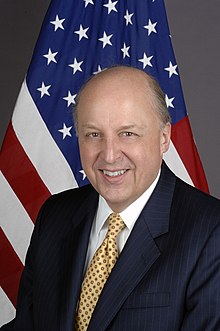Negroponte doctrine

On July 26, 2002, John Negroponte, the United States Ambassador to the United Nations, stated (during a closed meeting of the UN Security Council) that the United States will oppose Security Council resolutions concerning the Israeli–Palestinian conflict that condemn Israel without also condemning terrorist groups. This became known as the Negroponte Doctrine, and has been viewed by officials in the United States as a counterweight to the frequent resolutions denouncing Israel that are passed by the UN General Assembly.
Widely reported summaries of Negroponte's statement (an official transcript of these closed-session remarks does not appear to have been released) have stated that for any resolution to go forward, the United States, which has a veto in the 15-nation council, would expect it to have the following four elements:
- A strong and explicit condemnation of all terrorism and incitement to terrorism;
- A condemnation by name of the al-Aqsa Martyrs' Brigade, Islamic Jihad and Hamas, groups that have claimed responsibility for suicide attacks on Israel;
- An appeal to all parties for a political settlement of the crisis;
- A demand for improvement of the security situation as a condition for any call for a withdrawal of Israeli armed forces to positions they held before the September 2000 start of the Second Intifada.[1]
See also[edit]
- Israel–United States relations
- Israel and the United Nations
- United States and the United Nations
- United States support for Israel in the 2023 Israel–Hamas war
References[edit]
- ^ "U.S.: UN Resolutions Must Condemn Palestinian Terror". Haaretz. July 27, 2002. Retrieved January 23, 2017.
External links[edit]
- "'The Negroponte Doctrine' concerning UN Security Council Resolutions on the Middle East". United States Mission to the United Nations. 6 October 2003. Archived from the original on 24 December 2003.
- "Ambassador Negroponte: Statement on the Middle East at the Emergency Special Session of the General Assembly, August 5, 2002". Archived from the original on 14 May 2005.
- Michael J. Jordan (8 December 2003). "Symbolic fight for Israel at UN". The Christian Science Monitor.
- Foreign policy doctrines of the United States
- Politics of the Israeli–Palestinian conflict
- United States and the United Nations
- Israeli–Palestinian conflict and the United Nations
- 2002 in the United States
- 2002 in international relations
- Foreign policy of the George W. Bush administration
- Israel–United States relations
- State of Palestine–United States relations
